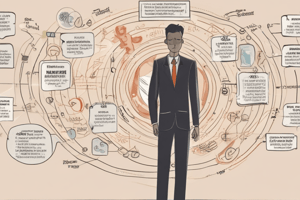Podcast
Questions and Answers
Which function of management focuses primarily on recruiting and developing employees?
Which function of management focuses primarily on recruiting and developing employees?
- Staffing (correct)
- Planning
- Directing
- Controlling
What is a key responsibility in the directing function of management?
What is a key responsibility in the directing function of management?
- Developing new products
- Setting financial budgets
- Motivating teams (correct)
- Recruiting employees
In which function of management would analyzing variances and identifying areas for improvement be critical?
In which function of management would analyzing variances and identifying areas for improvement be critical?
- Organizing
- Directing
- Staffing
- Controlling (correct)
Which of the following is NOT a responsibility of the staffing function?
Which of the following is NOT a responsibility of the staffing function?
What is an essential activity performed in the controlling function of management?
What is an essential activity performed in the controlling function of management?
What is the primary objective of the planning function in management?
What is the primary objective of the planning function in management?
Which activity is NOT part of the planning function in management?
Which activity is NOT part of the planning function in management?
In the organizing function, what is the primary purpose of assigning resources?
In the organizing function, what is the primary purpose of assigning resources?
What aspect of organizing involves defining relationships and responsibilities?
What aspect of organizing involves defining relationships and responsibilities?
What is a key component of the organizing function?
What is a key component of the organizing function?
What does the planning function ideally include when faced with potential issues?
What does the planning function ideally include when faced with potential issues?
Which of the following best describes the role of management as an integrated process?
Which of the following best describes the role of management as an integrated process?
Which of the following best defines the goal-oriented nature of management?
Which of the following best defines the goal-oriented nature of management?
Flashcards
Staffing Function
Staffing Function
Recruiting, selecting, training, and developing employees to fill roles.
Directing Function
Directing Function
Motivating and overseeing employees to achieve goals.
Controlling Function
Controlling Function
Monitoring performance and taking corrective actions.
Employee Roles
Employee Roles
Signup and view all the flashcards
Performance Monitoring
Performance Monitoring
Signup and view all the flashcards
Management Definition
Management Definition
Signup and view all the flashcards
Management's Goal
Management's Goal
Signup and view all the flashcards
Continuous Process of Management
Continuous Process of Management
Signup and view all the flashcards
Planning Function
Planning Function
Signup and view all the flashcards
Organizing Function
Organizing Function
Signup and view all the flashcards
Management is all-pervasive
Management is all-pervasive
Signup and view all the flashcards
Management is a group process
Management is a group process
Signup and view all the flashcards
Management is a responsibility
Management is a responsibility
Signup and view all the flashcards
Study Notes
Definition of Management
- Management is the process of planning, organizing, directing, and controlling the resources of an organization to achieve its goals efficiently and effectively.
- It's a set of activities, not a specific job title.
- Management involves coordinating human, financial, and material resources.
- Management is a continuous and dynamic process.
- The goal of management is to achieve organizational objectives.
- Effective management leads to improved productivity, profitability, and overall organizational success.
- Good managers possess a variety of skills, including technical, interpersonal, conceptual, and decision-making skills.
Nature of Management
- Management is a continuous process, not a one-time event.
- It's a goal-oriented process, aimed at achieving organizational objectives.
- Management is all-pervasive, meaning it's present in every function of an organization.
- It's multi-dimensional and deals with numerous aspects of an organization.
- It's a group process, involving multiple individuals and their interactions.
- Management is dynamic and involves adaptations to changes in the environment.
- It's an intangible force influencing organizational behavior and performance.
- Management involves both art and science. Science provides principles, while art involves skill.
- It is an integrated process. It combines various activities within a framework to achieve the organizational goals.
- Management is a responsibilities oriented process, focused on ensuring that tasks are completed.
Functions of Management
- Planning: This involves setting objectives, establishing strategies for achieving those objectives, and developing detailed plans to implement strategies.
- Planning involves:
- Forecasting likely outcomes.
- Determining the need for resources, both financial and human.
- Setting deadlines, milestones, and priorities.
- Developing contingency plans, in anticipation of potential issues.
- Organizing: This function is about structuring the organization to achieve its objectives.
- Arranging tasks logically from the start to finish. Defining the relationships and responsibilities of different roles in the company hierarchy.
- Assigning resources effectively to achieve company goals. Determining the required resources for each task or team and ensuring they have access to the resources.
- Staffing: This function involves recruiting, selecting, training, and developing employees to fulfill the roles defined in the organizational structure.
- Determining the exact skills and abilities needed to fulfil the different roles.
- Recruiting the best people for each role.
- Training and developing employees to improve their skills and performance.
- Directing: This function involves overseeing and motivating employees to achieve objectives effectively.
- Motivating teams to achieve planned objectives.
- Informing workers of their roles and responsibilities.
- Guiding, leading, and supervising team members to achieve planned objectives.
- Guiding staff, resolving conflict, and using appropriate communication styles.
- Controlling: This function monitors performance against established standards and takes corrective action when needed.
- Monitoring performance levels against the planned outcomes.
- Taking corrective action when performance levels are not meeting the planned outcomes.
- Ensuring goals or tasks are completed accurately and efficiently.
- Analyzing variances and identifying areas of improvement.
Studying That Suits You
Use AI to generate personalized quizzes and flashcards to suit your learning preferences.




